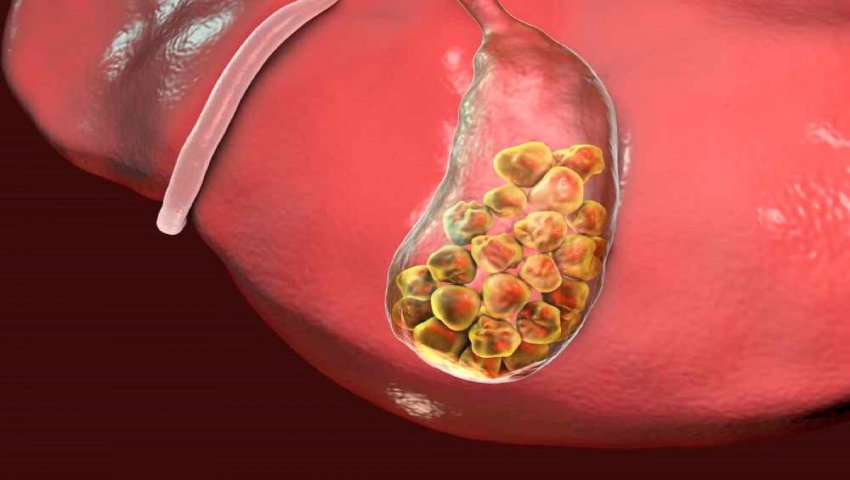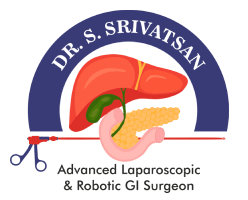
- 01/04/2025
- Dr. Srivatsan Gurumurthy
- 0 Comments
- Blog
The Impact of Lifestyle Factors on Gallstone Formation
Gallstones are a common digestive disorder affecting millions worldwide. These solid particles form in the gallbladder due to an imbalance in bile composition. While genetics play a role, lifestyle factors significantly influence gallstone formation. Understanding these factors can help individuals take preventive measures and reduce their risk.
The best gallstone treatment specialist, Dr Srivatsan Gurumurthy, is a minimally invasive surgery expert at GEM Hospital in Chennai. His skill in robotic-assisted laparoscopic surgery has helped numerous patients achieve good outcomes. In this blog, we will discuss the role of diet, weight, exercise, and other lifestyle habits in gallstone development.
Understanding Gallstones:
Gallstones are solidified accumulations of digestion juice that form within the gallbladder. They are of different size and make-up, the two most frequent being:
- Cholesterol Gallstones – principally made of cholesterol and are common in developed countries.
- Pigment Gallstones – Composed of bilirubin and more prevalent in patients with liver disease.
Gallstones are either asymptomatic or cause gallbladder inflammation, pain, and gastrointestinal symptoms, which are treatable.
Key Lifestyle Variables Contributing to Gallstone Formation:
Nutrition and Diet:
Diet is also highly significant in gallstone development. Deficient diets can lead to a bile imbalance, which can lead to the formation of stones.
- High-Fat and High-Cholesterol Diet – More consumption of processed foods and saturated fat raises the cholesterol in the bile, leading to the causation of gallstones.
- Low-Fiber Diet – A low-fiber diet slows down digestion and bile secretion, increasing the risk of gallstones.
- Crash Diets and Weight Loss – Sudden weight loss results in the undue discharge of cholesterol into the bile, causing gallstone formation.
- Dehydration – Insufficient water consumption may cause bile concentration and elevate the risk of gallstones.
Obesity and Sedentary Lifestyle:
- Obesity is among the important risk factors for gallstones because excess body fat results in a greater secretion of cholesterol into the bile.
- Physical Inactivity retards bile flow, allowing for stone formation.
- Regular Exercise increases metabolism, avoids obesity, and facilitates normal bile function.
Fasting and Irregular Consumption Patterns:
- Prolonged fasting leads to bile stasis, followed by cholesterol crystallization and stone formation.
- Skipping meals provokes inefficient gallbladder emptying that encourages the risk of sludge formation.
Alcohol and Smoking Consumption:
- Smoking modifies the composition of bile and increases oxidative stress, leading to gallbladder dysfunction.
- Consumption of alcohol has two effects—moderate alcohol intake reduces gallstone risk, but heavy alcohol intake devastates liver function, with secondary effects on bile secretion.
Stress and Sleep Patterns:
- Chronic Stress interferes with hormone control, which makes gallstones more likely.
- Sleep Deprivation affects metabolism and bile biochemistry, raising the susceptibility to gallstones.
Other Contributing Factors:
- Genetics and Family History – The Risk is augmented in families prone to gallstone development.
- Hormonal Effect – Women, particularly those taking birth control pills or hormone replacement therapy (HRT), are at increased risk.
- Underlying Conditions – Diabetes, liver disease, and metabolic syndrome are responsible for the development of gallstones.
Preventive Care and Lifestyle Changes:
Adopting a healthy lifestyle can dramatically reduce the risk of gallstones:
- Balanced Diet – Consume fibre foods, healthy fats, and lean proteins.
- Healthy Weight – Avoid crash diets; look for gradual weight loss.
- Stay Hydrated – Drink enough water to supply good bile consistency.
- Exercise Daily – Do moderate exercise to improve digestion.
- Avoid Smoking and Restrict Alcohol – Lessen oxidative stress and encourage healthy bile.
- Regular Medical Check-Ups – Monitor liver and gallbladder function, particularly in at-risk patients.
When to Look for Medical Assistance:
Those with chronic gastrointestinal issues, intense abdominal pain, nausea, or jaundice need to be rushed to the physician. Diagnosis is carried out through ultrasound scans, and treatment ranges from medication to gallbladder removal surgery (cholecystectomy).
Dr. Srivatsan Gurumurthy's Specialization in Gallstone Management:
Dr. Srivatsan Gurumurthy, a renowned robotic-assisted laparoscopic surgeon, specializes in less-invasive gallstone surgery. With vast experience at GEM Hospital and SS Clinic, he offers state-of-the-art treatment solutions for patient safety and rapid recovery.
Why Choose Dr. Srivatsan Gurumurthy?
- Expertise in robotic and laparoscopic gallbladder surgery.
- Latest diagnostic and surgical techniques.
- Patient-centred strategy towards successful rehabilitation.
- Work with world-class hospitals such as GEM Hospital.
Conclusion:
Gallstones are largely avoidable through lifestyle modifications. A healthy diet, regular exercise, and proper weight can work wonders in reducing the risk. Seeking guidance from an experienced medical professional like Dr Srivatsan Gurumurthy, who is associated with GEM Hospital and SS Clinic, can prove to be of immense help in the treatment and management of gallstones. Take action today for a healthy gallbladder.
